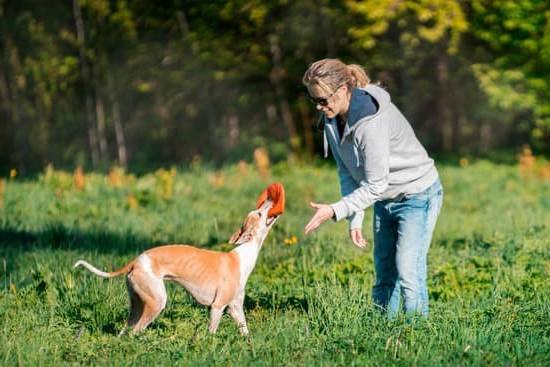Service dogs play a crucial role in assisting individuals with disabilities, providing them with the support and independence they need to navigate their daily lives. Behind every well-trained service dog is a dedicated and skilled service dog trainer. If you have ever wondered how to become a trainer for service dogs, this article will provide you with the necessary information and steps to embark on this rewarding career path.
Service dog trainers are responsible for selecting, training, and socializing dogs that will eventually be matched with individuals in need of their assistance. They play a vital role in ensuring that these dogs are well-behaved, obedient, and capable of performing their specialized tasks. Becoming a service dog trainer requires not only a love for dogs but also a deep understanding of the specific needs of individuals with disabilities.
This article aims to guide you through the process of becoming a service dog trainer by providing insight into the qualities and skills needed for success in this field, researching suitable training programs, completing the necessary education and training, gaining hands-on experience with service dogs, obtaining certification and licensing, finding employment opportunities, and building a successful career as a service dog trainer.
Whether you are looking to enter this field as a professional or simply want to learn more about what it takes to train service dogs, this comprehensive guide will serve as an invaluable resource on your journey.
Understanding the Role of a Service Dog Trainer
Service dog trainers play a crucial role in helping individuals with disabilities lead independent lives. These trainers are responsible for selecting, training, and matching service dogs with their handlers. They also provide ongoing support and education to ensure the successful partnership between the service dog and their handler. Understanding the role of a service dog trainer is essential for those interested in pursuing this rewarding career.
Selecting and Training Service Dogs
One of the main responsibilities of a service dog trainer is to select suitable dogs for service work and train them to perform specific tasks that assist individuals with disabilities. Trainers carefully evaluate potential candidates based on their temperament, health, and physical attributes. They must have a deep understanding of various breeds and their unique characteristics.
Once selected, trainers use positive reinforcement techniques to teach service dogs essential obedience skills such as sitting, staying, and coming when called. Additionally, they train dogs to perform specialized tasks according to the needs of the individual with a disability. These tasks may include retrieving necessary items, opening doors or cabinets, providing stability assistance, alerting to medical conditions like seizures or diabetes, or even providing emotional support.
Matching Dogs with Handlers
Another important aspect of a service dog trainer’s role is to ensure an appropriate match between the dog and their handler. This involves considering factors such as lifestyle, physical abilities, and individual preferences. Trainers assess both the dog’s capabilities and the handler’s needs to create a successful partnership.
Matching a service dog with its handler requires careful observations during training sessions and interactions between them. Trainers analyze how well the dog responds to cues from the handler and if they can fulfill the specific needs identified during initial evaluations. Through this process, trainers aim to create a cohesive team that can work together effectively.
Understanding these key aspects of being a service dog trainer provides valuable insight into what it takes to excel in this role. In the next section, we will explore the qualities and skills necessary for aspiring service dog trainers to possess.
The Qualities and Skills Needed to Become a Service Dog Trainer
To become a successful service dog trainer, there are certain qualities and skills that are essential for the job. These traits will not only help you excel in training and working with service dogs, but they will also ensure the well-being and success of the dogs themselves.
Patience and Empathy
One of the most important qualities needed to become a service dog trainer is patience. Training a service dog can be a time-consuming process, with each dog progressing at its own pace. You must be patient and understanding, allowing for setbacks and mistakes along the way. Additionally, empathy is crucial as you need to be able to understand and connect with both the dogs you are training and their handlers who rely on them for assistance.
Strong Communication Skills
Effective communication is key when working with both dogs and humans as a service dog trainer. Not only do you need to be able to clearly convey instructions to the dogs during training sessions, but you also need to effectively communicate with their handlers. The ability to listen attentively, ask relevant questions, and explain concepts in a clear and concise manner is essential for building trust and fostering a positive working relationship with both humans and dogs.
Flexibility and Problem-Solving Abilities
Service dog training is not always straightforward, as each dog may present unique challenges or require customized approaches. As a trainer, it is important to be flexible in your methods and problem-solving strategies. Being able to adapt your training techniques based on an individual dog’s needs or responding creatively when faced with unexpected situations will greatly contribute to your success as a service dog trainer.
Persistence and Determination
Training service dogs can be demanding both physically and mentally. It requires long hours of practice, repetition, and consistency. A successful trainer needs to have persistence in order to overcome obstacles or setbacks that may arise during the training process. Being determined to stay committed and focused on achieving the end goal of a well-trained service dog is a vital quality for any aspiring trainer.
Researching and Choosing the Right Training Program
One of the crucial steps in becoming a service dog trainer is researching and choosing the right training program. This decision plays a significant role in your education and future career, so it’s important to carefully consider your options.
When researching training programs, you should look for programs that are reputable and accredited. Accreditation ensures that the program meets certain standards of quality and can give you confidence in the education you receive. Additionally, consider programs that have a strong emphasis on positive reinforcement training methods, as this is widely regarded as the most effective approach for working with service dogs.
It can also be helpful to reach out to current or former students of the program to gain insights into their experiences. Ask about the curriculum, instructors, hands-on practice opportunities, and any additional resources or support provided by the program. This firsthand information can give you a better understanding of what to expect and whether the program aligns with your goals.
Once you have narrowed down your options, take the time to visit or attend an information session for each program you are considering. This will allow you to get a feel for the atmosphere and ask any remaining questions you may have. Ultimately, finding a training program that resonates with you and provides a comprehensive education in service dog training is essential for setting yourself up for success in this field.
| Aspect | Considerations |
|---|---|
| Accreditation | Look for programs that are reputable and accredited. |
| Positive Reinforcement | Consider programs that prioritize positive reinforcement methods. |
| Student Experiences | Talk to current or former students for insights into their experiences. |
| On-Site Visit | Visit or attend an information session for each program to get a feel for the atmosphere and ask any remaining questions. |
Completing the Necessary Education and Training
To become a service dog trainer, it is important to have a strong foundation of knowledge and skills in training dogs. This requires completing the necessary education and training programs that specialize in service dog training. These programs provide comprehensive instruction on various aspects of dog behavior, training techniques, and specific skills needed for training service dogs.
One option for obtaining the necessary education and training is to enroll in a reputable service dog training program. These programs are typically offered by dog training schools or organizations that specialize in service dog training. It is crucial to thoroughly research and choose a program that has a good reputation and offers comprehensive coursework.
Another option is to pursue a degree or certification in animal science, veterinary technology, or a related field. While this may not specifically focus on service dog training, it can provide valuable knowledge about animal behavior, learning theory, and obedience training methods. Additionally, some universities offer specific courses or workshops on service dog training as part of their curriculum.
In addition to formal education programs, aspiring service dog trainers can also benefit from attending seminars, workshops, and conferences related to dog behavior and training. These events offer opportunities to learn from experienced trainers, gain insights into the latest techniques and research in the field, and network with professionals who share similar interests.
Completing the necessary education and training provides aspiring service dog trainers with the knowledge and skills required to effectively train service dogs. It lays the foundation for understanding canine behavior, implementing appropriate training techniques, and addressing specific needs of individuals who require assistance from service dogs.
| Training Program | Eligibility | Degree/Diploma/Certification Offered |
|---|---|---|
| Program A | High school diploma or equivalent | Certificate in Service Dog Training |
| Program B | College degree or equivalent work experience with animals | Associate’s Degree in Service Dog Training |
| Program C | No formal requirements | Diploma in Canine Behavior and Service Dog Training |
Gaining Hands-On Experience with Service Dogs
Gaining hands-on experience with service dogs is a crucial step in becoming a trainer. This section will outline the various ways individuals can gain practical experience working with service dogs.
One way to gain hands-on experience is by volunteering at organizations or programs that train service dogs. These organizations often rely on volunteers to help with various tasks such as feeding, grooming, and exercising the dogs. Volunteering not only allows aspiring trainers to learn more about working with service dogs but also provides them with the opportunity to observe and learn from experienced trainers.
Another option is to seek an apprenticeship or mentorship with a professional service dog trainer. This can provide invaluable hands-on experience under the guidance and supervision of an experienced professional. Apprenticeships may involve tasks such as assisting with basic training exercises, observing client interactions, and learning about obedience training techniques.
Attending workshops, seminars, or conferences related to service dog training is another excellent way to gain hands-on experience. These events often feature demonstrations, interactive sessions, and opportunities for participants to interact directly with trained service dogs. Networking at these events can also lead to potential mentorship or job opportunities in the field.
Additionally, individuals can consider fostering a service dog in training through reputable organizations. Fostering not only helps these organizations provide necessary care for their dogs but also offers aspiring trainers the chance to have constant exposure to a service dog’s daily routines and activities.
By gaining hands-on experience through volunteering, apprenticeships, attending workshops/conferences, or fostering a service dog in training, individuals can enhance their knowledge and skills required to become successful service dog trainers.
Obtaining Certification and Licensing as a Service Dog Trainer
Becoming a certified and licensed service dog trainer is an important step in establishing credibility and ensuring that you have the necessary qualifications to excel in this field. Certification provides validation of your skills and knowledge, while licensing ensures that you meet certain standards set by professional organizations or regulatory bodies.
To obtain certification as a service dog trainer, there are several routes you can take. One option is to go through a program offered by a recognized organization specializing in service dog training. These programs often include both theoretical coursework and hands-on training with real service dogs. It is crucial to thoroughly research and choose a reputable program that aligns with your goals and values.
Another pathway towards certification is participating in apprenticeships or internships under the guidance of experienced service dog trainers. This allows you to gain practical experience while learning directly from professionals in the industry. Some organizations may require a minimum number of supervised hours before they grant certification, so be prepared to dedicate significant time and effort during this stage.
In addition to certification, you may also need to obtain specific licenses depending on your jurisdiction’s regulations. Licensing requirements can vary significantly, so it is essential to understand your local laws and regulations pertaining to service dog training. Some regions may require trainers to hold professional licenses, whereas others might mandate registration with designated agencies or governing bodies.
By obtaining certification and licensing as a service dog trainer, you demonstrate your commitment to excellence and professionalism within the field. These credentials not only boost your chances of finding employment but also provide reassurance to clients who entrust their dogs’ training to you. It is advisable to stay up-to-date with evolving industry standards by pursuing continuing education opportunities throughout your career as a service dog trainer.
Finding Employment and Building a Successful Career as a Service Dog Trainer
Building a successful career as a service dog trainer requires more than just completing training programs and obtaining certification. It also involves finding employment opportunities that align with your goals and values in the field. There are several avenues you can explore to find employment as a service dog trainer.
One option is to work for an established organization or agency that trains and provides service dogs to individuals in need. Many nonprofit organizations, such as Canine Companions for Independence and Guide Dogs for the Blind, employ trainers to work directly with the dogs and clients. These organizations may offer benefits such as competitive salaries, healthcare coverage, and opportunities for professional growth.
Another option is to start your own training business. This can be a challenging but rewarding path, as it allows you to have more control over your career and the dogs you work with. However, starting a business requires careful planning, marketing strategies, and financial considerations.
Networking is also crucial in finding employment as a service dog trainer. Attend conferences, workshops, and seminars related to service dog training to connect with other professionals in the field. Building relationships with these individuals can lead to job offers or referrals.
It’s important to keep in mind that building a successful career as a service dog trainer may take time and patience. Be prepared to start at an entry-level position or internship role to gain experience before moving up in the field. Additionally, continually updating your knowledge and skills through continuing education courses can help you stay competitive in this ever-evolving profession.
By exploring different avenues of employment, networking with professionals in the field, and continuously honing your skills, you can build a successful career as a service dog trainer while making a difference in the lives of individuals who rely on these amazing animals.
The Rewards and Challenges of Being a Service Dog Trainer
Being a service dog trainer can be an incredibly rewarding and fulfilling career path. However, it is important to understand that it also comes with its fair share of challenges. In this section, we will explore the rewards and challenges of being a service dog trainer.
Rewards of Being a Service Dog Trainer
- Making a Positive Impact: One of the most rewarding aspects of being a service dog trainer is knowing that you are making a significant difference in someone’s life. By training service dogs, you are helping individuals with disabilities gain independence and improve their quality of life.
- Forming Special Bonds: strong>As a service dog trainer, you have the opportunity to form deep bonds not only with the dogs you train but also with the individuals they serve. Witnessing the strong bond between a service dog and their handler is truly heartwarming and can create lifelong connections.
- Seeing Results: It is immensely satisfying to see the progress that both the dogs and handlers make throughout the training process. Witnessing firsthand how your training enables individuals to overcome challenges and achieve greater independence is incredibly rewarding.
Challenges of Being a Service Dog Trainer
- Emotional Challenges: Working as a service dog trainer can bring about emotional challenges. You may encounter situations where dogs do not pass certain tests or are unable to fulfill their intended roles. Dealing with these setbacks can be difficult emotionally as trainers often become attached to the dogs they work with.
- Physical Demands: The job of a service dog trainer can be physically demanding as well. Training sessions often involve physical activities such as walking, running, and general exercise for both the dogs and trainers. Additionally, trainers may need to assist handlers with physical tasks that the dogs are trained to do.
- Constant Learning and Adaptation: Service dog training is an ever-evolving field, requiring trainers to stay updated on the latest techniques, methodologies, and laws related to service dogs. The ability to adapt and continuously learn is essential in order to provide the best possible training for both the dogs and the handlers.
Being a service dog trainer involves a unique combination of rewards and challenges. Despite these challenges, the positive impact you can make on individuals’ lives as well as the deep bonds you form with both dogs and handlers make it a highly rewarding career choice.
Conclusion
Becoming a service dog trainer is a rewarding and fulfilling career path for those who have a passion for helping both animals and people. Throughout this article, we have explored the necessary qualities, education, training, and experience needed to pursue this profession. Now that you have a better understanding of the steps involved, here are some key takeaways to help you begin your journey as a service dog trainer.
First and foremost, it is essential to fully comprehend the role of a service dog trainer before embarking on this career path. Service dog trainers play a vital role in transforming puppies into highly skilled assistants for individuals with disabilities. They not only train these dogs in various commands but also work closely with their handlers to ensure a strong bond and effective communication.
To become a service dog trainer, it is crucial to possess certain qualities such as patience, compassion, empathy, and excellent communication skills. Additionally, gaining hands-on experience working with dogs and completing an accredited training program will provide you with the necessary knowledge and expertise.
Researching and choosing the right training program is another crucial step in becoming a successful service dog trainer. Look for programs that offer comprehensive knowledge in areas such as canine behavior, obedience training techniques, disability-related laws, and ethics.
Once you have completed your education and obtained hands-on experience working with service dogs, it is important to obtain certification and licensing. These credentials will not only validate your expertise but also open up employment opportunities in various settings such as nonprofit organizations or private businesses.
Finally, finding employment and building a successful career as a service dog trainer requires dedication and perseverance. Networking within the industry, joining professional associations or organizations, and continuously expanding your knowledge through continuing education will all contribute to your success.
In conclusion, beginning your journey as a service dog trainer may seem overwhelming at first; however, if you are committed to following the necessary steps outlined in this article combined with your passion for helping others through the power of canine companionship, you are well on your way to successfully embarking on this fulfilling career path.
Frequently Asked Questions
How do I become a service dog trainer in Canada?
To become a service dog trainer in Canada, it is important to gain a comprehensive understanding of dog behavior, training techniques, and disability laws and regulations. The first step is to obtain relevant education or certification in dog training from recognized institutions or organizations such as the Certification Council for Professional Dog Trainers (CCPDT). This can be achieved through completing courses, apprenticeships, or formal education programs focusing on dog training and behavior modification.
Additionally, gaining experience by working with experienced trainers or volunteering at service dog organizations can be invaluable. Networking within the industry and staying updated on the latest training methodologies and research is also crucial. It may also be necessary to obtain any required licenses or permits depending on your specific location within Canada.
How do I become a service dog trainer UK?
In the UK, becoming a service dog trainer requires a combination of education, practical experience, and certifications. Firstly, gaining knowledge and expertise in animal behavior is essential. Obtaining relevant qualifications in dog training from reputable institutions such as The Association of Pet Dog Trainers (APDT) or the Institute of Modern Dog Trainers (IMDT) can provide a solid foundation.
Practical experience is equally important; working with experienced trainers or getting involved with assistance dog organizations can help you develop the necessary skills. Volunteering at local animal shelters or rescue centers can also offer valuable exposure to different types of dogs and their behavioral issues. Building a network within the industry through attending seminars and workshops, joining professional organizations like APDT or IMDT, and keeping up-to-date with advancements in training techniques are crucial steps towards becoming a service dog trainer in the UK.
Is Animal Behavior College legit?
Animal Behavior College (ABC) is considered legit by many individuals who have successfully completed their programs and gone on to pursue careers in the pet care industry. ABC offers various programs related to animal behavior and training which cover topics like basic obedience training, advanced canine fitness, grooming instructions, veterinary assisting etcetera. However, as with any educational institution, it is important to conduct thorough research before enrolling to ensure that the program aligns with your career goals and meets recognized industry standards.
Reading online reviews and testimonials from former students can provide insight into the quality of education provided by ABC. Additionally, checking if ABC has any affiliations or accreditations from reputable organizations can serve as an indicator of its legitimacy.

Welcome to the blog! I am a professional dog trainer and have been working with dogs for many years. In this blog, I will be discussing various topics related to dog training, including tips, tricks, and advice. I hope you find this information helpful and informative. Thanks for reading!





